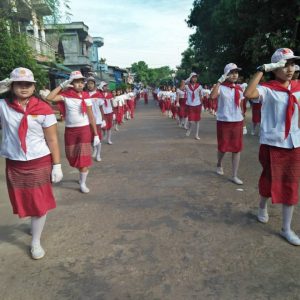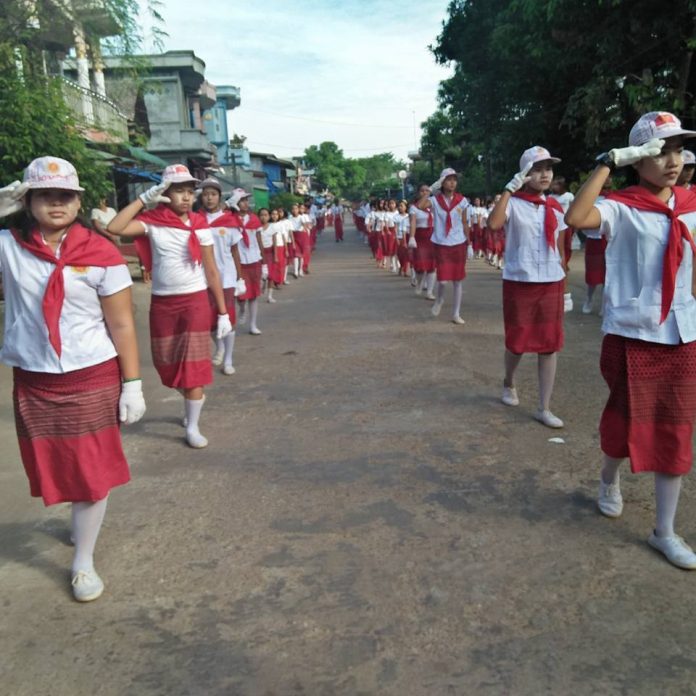A call for equal representation in the peace process, national parliament and other major public appointments has been widely reported in our country over the past 5-6 years with the perception of equality and equity
between male and female public life. After reading articles from various sources, I recalled grandmother’s story and my mother who have been living without hope for any political changes. ‘Girl’, ‘mother’ or ‘grandmother’ are simply names, focusing on age and status but they are simply female by body shape.
My grandfather was killed by Japanese troops in his own yard when my mother was just over two years old. My grandmother passed away when I was about 8 years old. The story was never told, until 2013 when I was at the age of 45. My mother was raised by her aunt because my grandmother is partially blind in her aging years. Both women have been living off a small rice field plot in Mon State. I was born near the rice field in my grandmother’s home in 1968. It was under military rule in my country.

I have four sisters that only completed primary school in the village except for the youngest, who did her distance learning to complete high school. She failed year nine but she has been selected to be a local Mon School Teacher in the village at the age of 19-20. She is now a mother of a single child. I am fully aware that there are countless women whom the plight is worse than my grandmother and my mother in social welfare and well being. I recalled that almost 95% of women in my village never reached high school in late 1990s, instead they had been working in rice fields or rubber plantations for a living. These women are trying to give themselves the best chance of obtaining sufficient shelters and food. They have not been provided access to education, healthcare or social services to the standard that women in the major cities received, at least by public funding.
72 years of growing up without good governance in the country, these women have been coping with social issues such as healthcare, safety in the village, and fear of domestic violence by evil men in the village. However, they have been finding a better place and time to live. Most women in grandmother’s generations lived under either British or Japanese invaders. My parents were living under both civilian and military rule for over 70 years.
When I returned to my village in 2013, after 19 years in exile, I found women riding motorbikes with mobile phone in hand. They also have western hairstyles and dress sense. My grandmother never saw either a phone nor a computer. However, she asked my mother to give birth to at least ten children. My mother reached the figure of two set of twins.
After reading the equality debate over the past 5-6 years, what is missing in the debate is both the male and female co-responsibilities in living, earning income and sharing domestic duties. This should be at the top of the agenda during the next forum. My grandmother did not receive a pension from the public fund her entire life. My mother at the age of 72, never received pension benefits from the government. Ultimately, her eight children looked after her and indeed, my father.
The debate of equal representation, and equity, in social and political public appointments shall examine the norm of both old and new beliefs in the language of ‘human rights’ beyond political propaganda. A child deserves equal love from both parents regardless of gender politics. The notion of equality is socially accepted but must be politically agreeable to manage a conflict of ideas.
The leaders of many ethnic armed groups simply do not think that political issues are relevant to women, and they impose arbitrary qualifications for participation in the peace process. One example of this is stipulating a minimum number of years of military involvement as a prerequisite for participation. This results in disqualifying women from participation because they tend to leave the army when they get married, commented by Jenny Hedström, writing for the Myanmar Times in December, 2016.
My grandmother passed away forty years ago. She had 17 great grandchildren but she merely recalled my brother and my sister as those older than me. She never asked for her rights and she took core responsibility over her two-year-old daughter when her husband was killed by the Japanese invaders.
Equal representation may not be the key agenda, but equal responsibility in social and political participation for both male and female is, at least, a simple domestic and national duty that can help share the pain and improve living standards. Politics is not a gender issue but is simply a human issue that cannot be solved separately by either the male or female unit.

